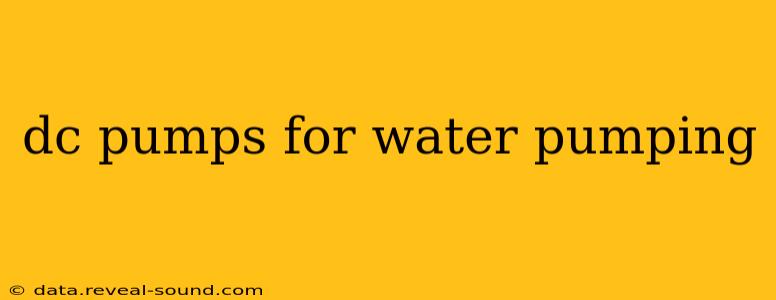DC pumps, powered by direct current electricity, are increasingly popular for water pumping applications due to their versatility, efficiency, and ease of integration into various systems. This comprehensive guide explores the world of DC pumps, delving into their applications, benefits, selection criteria, and common questions.
What are the Advantages of Using DC Pumps for Water Pumping?
DC pumps offer several compelling advantages over their AC counterparts. Their energy efficiency, especially in variable-speed applications, is a significant benefit, leading to lower operating costs and a smaller carbon footprint. The ability to precisely control flow rate and pressure through variable speed drives (VSDs) provides superior system optimization. This control also reduces wear and tear on the pump and associated components, extending their lifespan. Furthermore, DC pumps are typically smaller and lighter, making them ideal for portable or space-constrained applications. Finally, their compatibility with solar power and battery systems makes them a sustainable choice for remote or off-grid locations.
What are the Different Types of DC Pumps Used for Water Pumping?
Several types of DC pumps cater to different water pumping needs:
-
Centrifugal Pumps: These are the most common type, using a rotating impeller to increase the water's velocity. They are suitable for a wide range of applications, from low-pressure domestic water supply to higher-pressure industrial uses.
-
Diaphragm Pumps: These pumps use a flexible diaphragm to move water, making them ideal for handling viscous fluids or liquids containing suspended solids. They are often preferred for applications requiring precise flow control and gentle handling of the pumped fluid.
-
Peristaltic Pumps: These pumps use a rotating roller to squeeze a flexible tube, moving the fluid inside. They are particularly suited for applications where contamination-free pumping is critical, such as in pharmaceutical or food processing industries.
-
Submersible Pumps: Designed for underwater operation, submersible DC pumps are often used in wells, ponds, or other submerged water sources. They are typically more robust and durable than surface-mounted pumps, able to withstand harsher conditions.
What are the Applications of DC Pumps in Water Pumping?
DC pumps find extensive use across a variety of water pumping applications, including:
-
Domestic Water Supply: Providing water to homes and buildings, often powered by solar energy for eco-friendly operation.
-
Irrigation: Efficiently delivering water to crops in agricultural settings, allowing for precise control of water usage.
-
Industrial Processes: Used in various industrial applications, such as cooling systems, chemical processing, and wastewater management.
-
Water Treatment: Facilitating water purification processes by pumping water through various filtration stages.
-
Marine Applications: Used in bilge pumps, freshwater systems, and other marine applications.
-
RV and Marine Applications: Compact and efficient DC pumps are perfect for providing water to RVs, boats, and other recreational vehicles.
How Do I Choose the Right DC Pump for My Water Pumping Needs?
Selecting the appropriate DC pump involves considering several key factors:
-
Flow Rate: The volume of water to be pumped per unit time.
-
Head Pressure: The vertical distance the water needs to be lifted.
-
Fluid Type: The characteristics of the water (e.g., viscosity, temperature, presence of solids).
-
Power Supply: The available DC voltage and current.
-
Duty Cycle: The frequency and duration of pump operation.
-
Budget: The cost of the pump and its associated components.
Careful evaluation of these parameters will ensure the selection of a pump that meets your specific needs and budget effectively.
How Much Does a DC Pump Cost for Water Pumping?
The cost of a DC pump for water pumping varies significantly depending on factors like flow rate, head pressure, pump type, and brand. Prices can range from a few hundred dollars for smaller, lower-capacity pumps to several thousand dollars for larger, high-capacity models. It's essential to obtain quotes from multiple suppliers before making a purchase.
What are the Maintenance Requirements for DC Water Pumps?
Regular maintenance helps extend the life and efficiency of DC water pumps. This includes periodic inspection of the pump's components, checking for leaks or wear, and ensuring proper lubrication. Cleaning the pump regularly, particularly if pumping water with sediment or debris, is crucial. The frequency of maintenance will depend on the pump's usage and the quality of the water being pumped.
This comprehensive guide provides a solid foundation for understanding DC pumps for water pumping. Remember to always consult with a qualified professional for assistance in selecting and installing the right pump for your specific needs.
